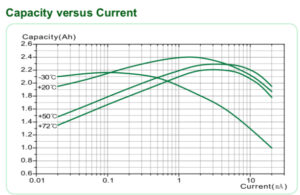Chemical resistance charts are very conservative, and they necessarily have to anticipate situations where the polypropylene pipe is under pressure and some temperature. Drum alarms are usually at room temperature, and never under pressure so please use our experience with applications to see if PP will work before ordering PVDF.
Lithium batteries are the best performing class of batteries in the cold. The short answer is that the capacity is reduced to half in -40 conditions. Here is a more detailed answer to this question from one of our suppliers Ultralife:
- “Lithium ion batteries can be operated at -40 degrees, but the cell impedance at that temperature will rise dramatically, resulting in significantly reduced output current. This is not harmful to the battery, but it will operate at a significantly lower voltage at any given current. Available capacity to a given cut-off voltage will also be reduced, perhaps to less than 20 percent of the capacity at 23 degrees C. The reason for the increase in impedance is that the liquid electrolyte becomes viscous at very low temperatures, which reduces its conductivity.
Not all Lithium batteries
Wireless range is a result of the particular layout in any installation. It is impossible to calculate which is why the industry gives range in terms of line-of-sight. For our products that number is 500 meters. In practice, in a factory with cinder-block walls, electrical conduits runnign everywhere etc., the actual range is about half of this or 250 m.
Yes. These have an ingress rating of IP65 which means they will resist any amount of hose-directed water. However, soap solutions are a challenge however as the lowered surface-tension will allow liquid to creep past the seals. So no soap or detergents, just water!
Yes. This is one of the unexpected benefits of a low level drum alarm – there’s no need to pump into day tanks, just use the drums that the chemical is delivered in. Saves factory floor space.
Ultralife brand lithium batteries typically last over 3 years in a production situation where they are alarming a few times a week and operators respond to the alarms in a few minutes. Their capacity rating of 1250 mA-hrs will allow 48 hours (~ 3000 minutes!) of continuous alarming. The shelf life if unused is 10 years.
Here is our guide based on our experience over the last 15 years:
Several alarms daily ………………….. 1 year
Once daily ……………………………….. 2 years
Once weekly …………………………….. 4 years
Occasionally …………………………….. 6 years
Never ……………………………………… 10 years
